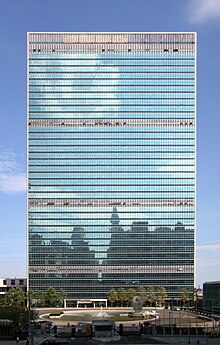Secretary-General of the United Nations
[2] The General Assembly resolution 51/241 in 1997 stated that, in the appointment of "the best candidate", due regard should be given to regional (continental) rotation of the appointee's national origin and to gender equality,[3]: 5 although no woman has yet served as secretary-general.However, the Security Council voted in private and followed the same process as previous selections, leading the president of the General Assembly to complain that it "does not live up to the expectations of the membership and the new standard of openness and transparency".These provisions have been interpreted as providing broad leeway for officeholders to serve a variety of roles as suited to their preferences, skill set, or circumstances.[10] Many of the secretary-general's powers are informal and left open to individual interpretation; some appointees have opted for more activist roles, while others have been more technocratic or administrative.[4] The secretary-general is often reliant upon the use of their "good offices", described as "steps taken publicly and in private, drawing upon his independence, impartiality and integrity, to prevent international disputes from arising, escalating or spreading".

President of the United Nations General AssemblyArabicChineseFrenchSpanishRussianEmblem of the United NationsFlag of the United NationsAntónio GuterresUnited Nations SecretariatHis ExcellencyChief administrative officerSecretariatGeneral AssemblyResidenceSutton Place, New York CityUnited Nations HeadquartersNew York Cityinternational territorySecurity CouncilTerm lengthUnited Nations CharterGladwyn JebbTrygve LieDeputy Secretary-GeneralUnited NationsChapter XVUnited Nations Secretary-General selectionSecretariat BuildingHeadquarters of the United Nationspermanent members of the council can vetomiddle powerscareer diplomatsBoutros Boutros-Ghalivetoed1996 selectionterm limit1981 selectionKurt Waldheimpapal conclavestraw pollsin 1950president of the General AssemblyUnited Nations Systembully pulpitDag HammarskjöldArab-Israel conflictJavier Perez de CuellarIran-Iraq WarU ThantCuban Missile CrisisSutton Place, ManhattanAnne MorganUN Regional GroupUnited KingdomWestern European and OthersWorld War IINorwayKorean WarSwedenCongo Crisistroikadied in a plane crashNorthern RhodesiaZambiaJohn F. KennedyNobel Peace PrizeAsia-PacificAnti-Fascist People's Freedom LeagueAlgerian independenceIsraelAustriaThird WorldNazi war crimespresident of AustriaUN War Crimes Commissionwar criminalWehrmachtJavier Pérez de CuéllarLatin American and CaribbeanSalim Ahmed SalimTanzaniaAfricanNon-Aligned MovementKofi AnnanBan Ki-moonSouth KoreaPortugalTimor-Lesteprime minister of PortugalSocialist InternationalUnited Nations High Commissioner for RefugeesHammarskjöldWaldheimPérez de CuéllarBoutros-GhaliGuterresEastern European GroupGRULACAsia-Pacific GroupAfrican GroupUnder-Secretary-General of the United NationsThe New York TimesWayback MachineTraub, JamesFarrar, Straus and GirouxSecretaries-generalLeague of NationsEric DrummondJoseph AvenolSeán LesterLeaders of the League of NationsDeputy Secretary-General of the United NationsUN Secretary General memoirsAmina J. MohammedGeneral Assembly President Dennis FrancisUN SystemCharterPreambleselectionsUnder-Secretary-GeneralPresidentInternational Court of JusticeStatuteElections